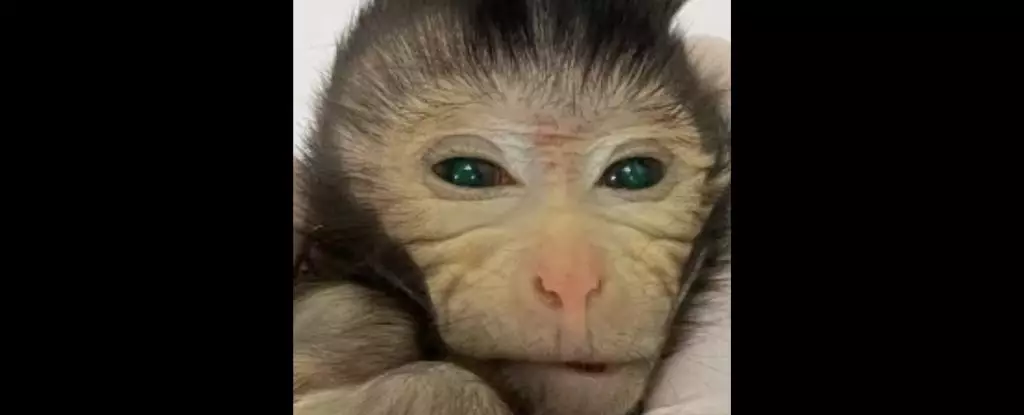Scientists in China have recently achieved a groundbreaking feat in primate research by successfully creating a chimeric long-tailed macaque using pluripotent stem cells. This unique primate possessed observable features such as green eyes and yellow fingertips, but it was the underlying genetic composition that made it truly remarkable. By fusing the pluripotent stem cells from two genetically distinct fertilized eggs, researchers were able to create an organism with cells and tissues derived from more than just two parents. In this article, we will delve into the details of this experiment, discuss the implications for future research, and address the ethical concerns surrounding chimeric animal studies.
The chimeric monkey created in this experiment exhibited tissue contributions from two separate stem cell lines in various parts of its body including the brain, heart, kidney, liver, gastrointestinal tract, testes, and cells that become sperm. The contribution of the extra donated stem cells ranged from 21 percent to an astonishing 92 percent, with the highest percentage observed in brain tissues. This far surpasses previous studies involving monkey chimeras, which yielded much lower donor cell contributions ranging from 0.1 to 4.5 percent.
Reproductive engineer Zhen Liu, a senior author of the study, highlights the importance of this breakthrough in primate research. By generating more precise monkey models for studying neurological diseases and other biomedical studies, scientists hope to gain a deeper understanding of various conditions and potentially develop new therapies. The ability to genetically edit donor stem cells opens up possibilities for disease testing in monkey models, as higher contributions of donor stem cells in target tissues would result in more accurate disease models.
While the potential benefits of accurate disease models are undeniable, chimeric animal research has raised ethical concerns. Proponents argue that the potential advancements in disease treatment outweigh these concerns. For example, relatively low percentages of chimerism, such as 10 percent, in egg and sperm cells can still be valuable models, as they have the potential to transfer to offspring. However, it is crucial to carefully consider the ethical implications of these experiments and ensure that they are conducted within established guidelines.
The creation of this chimeric monkey represents a significant advancement in the field, but the overall efficiency of the process remains low. Only six live births occurred out of the implanted embryos, and only one of these live monkeys displayed stem-cell-derived tissue in multiple regions of its body. The low efficiency could be attributed to various factors, such as the culture conditions of the stem cells and embryos. Improving the survival rate of both the embryos and fetuses is an ongoing challenge that researchers aim to address in future studies.
Despite the challenges faced, this experiment provides valuable insights into the differentiation of stem cells in primates. The researchers have demonstrated that naive monkey pluripotent stem cells can differentiate in vivo into the various tissues that compose a monkey’s body. This finding could pave the way for further investigations into the early stages of stem cell differentiation in primates, an area that is not as extensively studied as in mice.
The creation of a chimeric monkey using pluripotent stem cells is a significant achievement in primate research. By manipulating the genetic composition of the offspring, researchers have expanded our understanding of stem cell differentiation and opened up new possibilities for disease modeling and therapy development. However, it is crucial to carefully consider the ethical implications and ensure that these experiments are conducted responsibly. With further advancements, scientists hope to continue unraveling the mysteries of primate biology and improve our ability to study and treat various diseases.


Leave a Reply